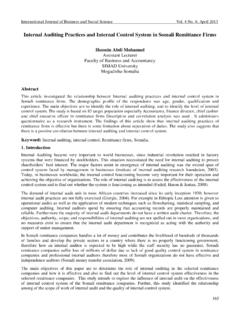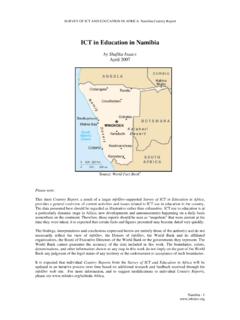Transcription of Questions for workplace needs analysis surveys
1 Page 1 of 10 Questions for workplace needs analysis surveys Notes 1. These Questions come from workplace basic skills surveys that include native-speakers. 2. Interviewers will need to reformulate Questions according to local circumstances so it is important that the aim of each question is clear to the interviewer. 3. To help the interviewer and to aid quantifiable analysis , create tick-box answers wherever possible. 4. In selecting Questions for inclusion in a survey , consider the report you aim to produce from the survey , but bear in mind that needs surveys serve several purposes: collecting information about the learning needs of individuals and the organisation offering the individual an opportunity to reflect constructively on their experience at work helping the learning provider understand the organisation building trust between the learning and individuals in the organisation generating enthusiasm among staff for a learning programme, etc.
2 You may wish to include Questions that will not generate information required for the report. 5. The content of informants answers are affected by the sequence of Questions and also at which point in the interview they occur. Experience suggests native-speaker informants take about 40 minutes to give a full account of themselves. The initial ten minutes is spent building rapport, so start with factual Questions . By the final ten minutes, the informant may be tiring so end with less demanding, more rewarding Questions , what learning the informant would like to pursue. 6. Where the informant s language skills are limited (and no translator is available), the interviewer will benefit from detailed knowledge of the informant s context ( their job role and the structure of the employer organisation). That detailed knowledge will help the interviewer understand and probe the informant s answers.
3 7. It is likely that different informants will give different accounts of workplace practices and events. 8. Asking informants to consider the needs of their team or department, rather than their own needs , may elicit useful information. Page 2 of 10 About the interview Interview time, date, location Name of interviewer Examples of introductory remarks My name is X. I work for Y. We are doing research to help improve opportunities for training and education in X. We want to talk to as many people as possible about this. Thank you for agreeing to help us with the research. We hope you will find it a useful opportunity to think about what training or personal development you might find useful. The information you give is confidential. It will not be reported back to anyone in a way that will identify you. I want to ask you some Questions about yourself; then about your job; then about learning and development.
4 The whole conversation should take about X [ 40] minutes. I shall be making notes to help me remember what you say. You are welcome to check what I write. You don t have to answer any question you don t want to. There are no right or wrong answers. All we want is what you really think. Would you like to ask me any Questions first? Examples of Questions about personal information Male Female Date of birth Age group: 16-19 20-24 25-35 36-44 45-54 55-65 Other (please specify): Where were you born: UK Other (please specify): Nationality: UK Other (please specify): If non-UK national Status: Permanent Temporary Asylum seeker Arrived in UK Main language at home: speaking reading writing Other languages spoken: speaking reading writing English: speaking reading writing English classes attended (a) Where: [locality] Other UK Other overseas Formal study of English How long for?
5 (a) School: < 1 year < 2 years > 2 years (b) Adult < 1 year < 2 years > 2 years Do you have any English language qualifications? No Yes (specify) What language(s) do you use at work? speaking reading writing Page 3 of 10 Do you have a disability? No Yes (please specify): Do you consider you are dyslexic? No Yes If yes , have you been assessed dyslexic by an educational psychologist? No Yes If yes , when (in what year) (iv) Do you have a statement? No Yes Ethnicity [ethnic monitoring for equality and diversity]: Examples of Questions about job role Now I would like to ask you about your role here in the organisation. What is your job title? What is your department [etc]? [Employment status] Do you work: Full time Part time Permanent Temporary Other (specify) How many hours are you contracted to work per week?
6 How many hours overtime do you work in a typical week? What shift pattern do you work? Days Evenings Nights Other (specify) How long have you done this job? < 12 months < 18 months < 3 years < 5 years Other (specify) Have you done other jobs here? (What?) How long have you worked for [this employer]? < 12 months < 18 months < 3 years < 5 years Other (specify) Why did you first decide to work here? type of work personal contact other (specify) When you joined [this employer] how long did you plan to stay? How long do you expect to stay now? Questions about what is done in the job Do you know the overall objective of your job? Yes No What is it? What responsibilities do you have in your present job? What are you personally responsible for in your job Do you have a job description? Yes No Does it describe your job accurately?
7 Yes No (How not?) Is your job important to the organisation? (How / why not?) Yes No Who reports to you? (How many?) Do you manage/supervise any staff? No Yes How many? Who do you report to? Supervisor: Manager: Do you work in a team? No Yes How many in the team [If yes ] What is the team responsible for? Describe a typical day at work Do you train others ( explain tasks, equipment)? Now Future informal, on the job training formal training courses If courses, specify: Do you feel comfortable in this training role? (Why not?) Yes No What s the best thing about your job? Responsibility Tasks People Other (specify) Page 4 of 10 Is there anything that can make your job awkward? Workload Specific tasks Colleagues Managers Customers Equipment Other (specify) What do you find most stressful about the job?
8 Do you feel well-supported in your job [by the organisation / managers]? (How / why not?) Yes No Do you feel valued [by the organisation / your managers]? (How / why not?) Yes No development opportunities staff awards informal acknowledgement other (specify) Do you feel fairly rewarded (pay/conditions) for the work you do? (Why?) Yes No Is there anything you would like to change about your job? (What?) Yes No Questions about the organisation What is the organisation s overall objective? Don t know What: What is your department s overall objective? Don t know What: How does the organisation measure its overall performance / success? Don t know How: How does the organisation measure performance / success in your own area of work? Don t know How: Do you feel that overall the organisation does what it sets out to do well?
9 (Why / why not?) Yes No Do you feel that in your own area of work the organisation does what it sets out to do well? (Why / why not?) Yes No Have you experienced change in your own area of work? (What?) Yes No Have you experienced change in the organisation in general? (What?) Yes No Have the changes been positive in your own area? (Why / why not?) Yes No Have the changes been positive elsewhere in the organisation? (Why / why not?) Yes No Have you found the changes stressful? (Which changes / why / why not?) Yes No Who do you see as senior management ? Does senior management keep you in touch with what it is doing? (How) Yes No briefings newsletter personal letter / e-mail global e-mail / intranet notice board other (specify) Does senior management keep itself in touch with what you are doing?
10 (How) Yes No Are you and your colleagues able to influence what happens here? (How / why not?) Yes No Are you and your colleagues able to feed back to your manager and above? (How / why not?) Yes No Would you like to be more involved in the decisions that affect you? (How / why not?) Yes No Does your manager check you know what is expected of you in your job? (How / how often / why not?) Yes No formal appraisal informal review team briefing individual briefing other (specify) Does your manager/supervisor ask you for your ideas about improving the job? (How / how often / why not?) Yes No Is the workplace unionised? Yes No [name of union] other (specify) Are you a union member? Yes No [name of union] other (specify) Does the union play a helpful role? (How?) Yes No representation health and safety education other (specify) Can you suggest any improvements in your area of work?





